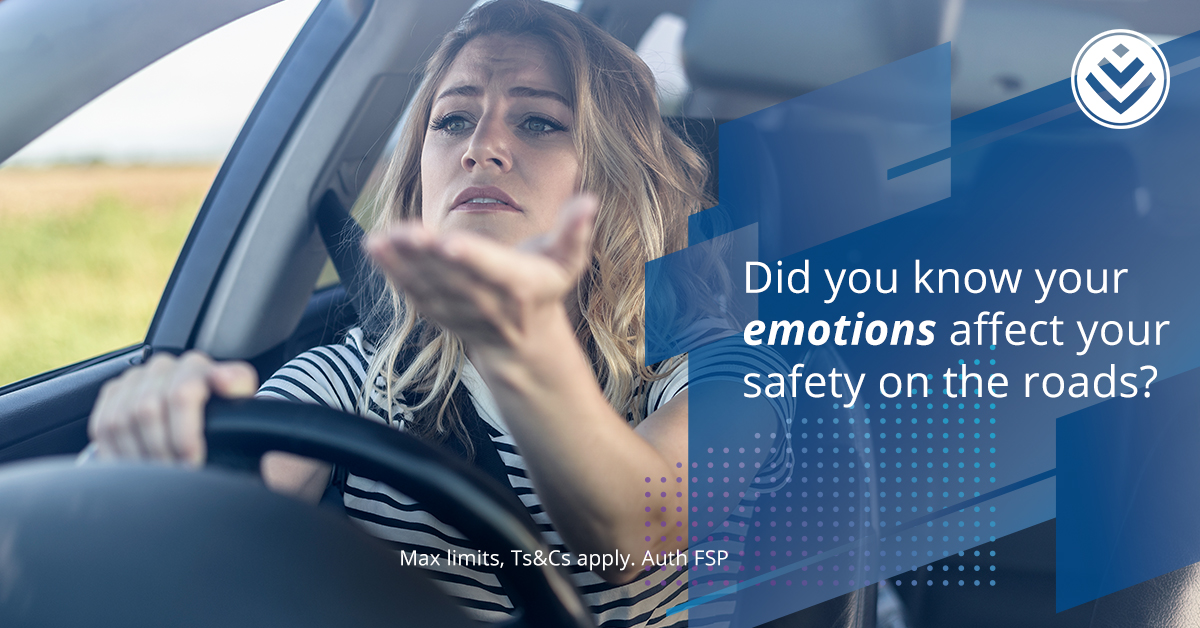We know texting and driving and drinking and driving are definite no-nos. Did you know strong emotions affect your driving ability too? Controlling your emotions while driving is just as important as other steps you take to keep safe on the roads.
Think of a time when you have been worried, upset, anxious or even excited. Did it meddle with your focus and influence how alert you were? Research shows that driving while you experience extreme emotions can be as dangerous as driving when you are tired and can be even more distracting than using a cellphone.
Any intense emotions affect your ability to do something and influence your thoughts, attitude and problem-solving skills. All of which are necessary while you navigate the roads – because it takes only seconds to miss the warning signs that might lead to an accident. Looking back on the situation, you will find you may have noticed the potential risk if you were calm or not preoccupied.
How does being emotionally overwhelmed affect road safety?
- When you are under immense stress, you can have tunnel vision. This makes it less likely to notice things happening around your car.
- Extreme emotions can make your observation and reaction times slower. This affects your precision and driving skills that need fast timing.
- You are less able to predict risky situations in traffic and feeling detached from your surroundings can cause riskier decisions in traffic.
- Intense emotions and anger can lead to road rage – possibly one of the most dangerous emotions you can experience while driving.
Avoid the dangers: 6 tips to keep your emotions under control
Controlling your emotions can make a big difference to your safety. Everyone is different, so you need to find what works for you. Here are some suggestions to keep your attention on the road and not allow emotions to affect your driving:
- Don’t dwell on other drivers’ actions that make you angry. Let it go and focus on staying safe rather than venting. Anger will only make things worse.
- Be courteous to other drivers. Cutting in, erratic lane changes and speeding, will at best save you a few seconds. At worst, it will land you and others in hospital.
- Take deep, slow breaths and count for a few seconds as you inhale and exhale. This can keep you focused, calm and able to handle stressful traffic better.
- Pull over at a safe location to take a short break and compose yourself. Stop at a shopping centre or petrol station when you feel overwhelmed by emotions such as anger or grief. Calm yourself by closing your eyes, breathing and turning the radio to soothing music or switching it off. It can also help to go for a short walk or to get a drink of water.
- Focus only on the road and on driving. Try to hold disturbing thoughts and emotions at bay until your journey is over.
- Leave earlier than necessary to make up for traffic and other hold-ups.
Be proactive in managing stress – it’s good for your health and road safety
Prevention is better than cure. This is also true when it comes to stress and your health. Being able to calm yourself while driving is valuable. Even better, is lowering your overall stress levels. This women’s month, take inventory of your self-care and take action to make it an important part of every day. It could include getting more sleep, doing an activity you like, learning relaxation techniques, meditating, connecting more with your friends and family or volunteering in your community. Whatever it is that lights you up and makes you feel less stressed can also help protect you against the dangers of extreme emotions affecting the way you drive. Be deliberate about practicing calmness and patience – it is good for your health and for your safety on the road!
Discovery rewards good driving behavior. They also offer Impact Alert to detect when you are in an accident and will send help immediately if they can’t get a hold of you. You can get a car insurance quote from Discovery.


